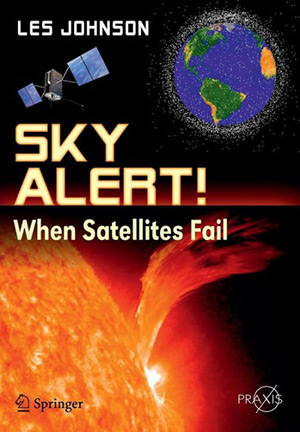Category: Non-Fiction
Reviewed by: Ted Spitzmiller
Title: Sky Alert!: When Satellites Fail
Author: Les Johnson
NSS Amazon link for this book
Format: Paperback
Pages: 200
Publisher: Springer/Praxis
Date: February, 2013
Retail Price: $29.95
ISBN: 978-1461418290
Even those who have followed the exhilarating move into space over the past half-century and who have a good appreciation for the many day-to-day activities that involve Earth satellites, may not truly comprehend how tenuous and entwined our existence has become with these high flying electronic marvels — so much so that any one of a half dozen likely scenarios that might befall these orbiting life-lines could impact our lives in a significant manner.
Author Les Johnson explores this situation in a compelling and relatively brief three part book. Johnson introduces the problem in a prelude called Chapter Summaries in which he provides an overview of the situation. If these few pages don’t compel you to move into the heart of the book, then you may have your head in the sand. But the devil is in the details as the author takes us through the various possible circumstances that might destroy or degrade the many hundreds of satellites that form this high-tech infrastructure.
That so many aspects of our daily lives have become dependent on satellite apps is shocking. Also unsettling is the number of methods by which these wonders of science could be put out of action. Ranging from natural events such as solar storms with their intense radiation, to terrorist nations targeting our crucial LEO satellites, to the plethora of orbiting debris, the threat is real.
Johnson moves through each aspect of the problem, highlighting some of the roles that various apps play in our lives such as GPS, communications, and military reconnaissance. He then describes how and why each of the threats could become real. He provides some interesting situations such as the inability to use your credit card to purchase food or fuel because of the credit system’s failure to complete a transaction — the Very Small Aperture Terminal (VSAT) link has failed. And the inability of the store to replenish food and fuel stocks because the communications network for the logistical supply for each of these is predominantly extraterrestrial.
For those who have seen the movie Gravity the problem of orbital debris is graphically portrayed although overstated — as is the propensity for Hollywood. That there are now about 500,000 pieces of orbital rubble circling the Earth at over 17,000 mph should give us pause to reflect.
Rogue nations of the world have access to nuclear weapons whose detonation in space could disable our military satellites and level the playing field with the advanced warfighting technologies of the US. Part 3 of the book describes various on-going programs to reduce orbital trash and the hardening of satellite electronics to reduce the effect of radiation.
Les Johnson serves as the Deputy Manager for NASA’s Advanced Concepts Office at the Marshall Space Flight Center. He has an MS in physics from Vanderbilt University and is the author of several books including science fiction novels.
This is an excellent and easy-to-read book that defines a problem of which we all should be aware. As for me, I think I’ll try to keep some greenbacks in my wallet just in case the Walmart VSAT fails.
© 2014 Ted Spitzmiller
Please use the NSS Amazon Link for all your book and other purchases. It helps NSS and does not cost you a cent! Bookmark this link for ALL your Amazon shopping!



















